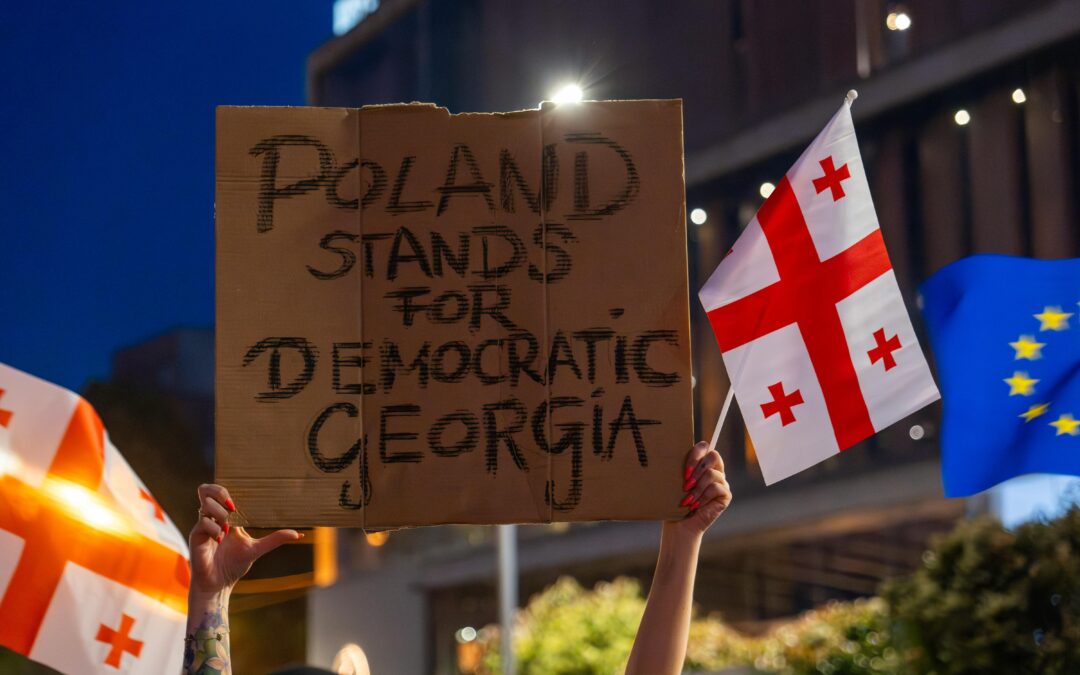Keep our news free from ads and paywalls by making a donation to support our work!

Notes from Poland is run by a small editorial team and is published by an independent, non-profit foundation that is funded through donations from our readers. We cannot do what we do without your support.
Poland has introduced an entry ban on eight representatives of the Georgian authorities who it says are “responsible for violence against protesters”.
The protests erupted following parliamentary elections in Georgia in October last year, the results of which were contested by opposition parties, civil society, and parts of the diaspora. The crisis further intensified when the government suspended Georgia’s accession process to the European Union.
“In response to the intensifying repression against the opposition in Georgia, Poland has banned from entering its territory eight representatives of law enforcement agencies responsible for using violence against protesters,” wrote Poland’s foreign ministry on Thursday.
“Poland will support the pro-European aspirations of Georgian society,” they added.
W reakcji na nasilające się represje wobec opozycji w Gruzji, Polska wprowadziła zakaz wjazdu na swoje terytorium dla 8 przedstawicieli resortów siłowych, odpowiedzialnych za stosowanie przemocy wobec protestujących
🇵🇱będzie wspierać proeuropejskie aspiracje 🇬🇪 społeczeństwa.
— Ministerstwo Spraw Zagranicznych RP 🇵🇱 (@MSZ_RP) April 17, 2025
The ban concerns mainly officials linked to the Georgian interior ministry and foreign ministry spokesman Paweł Wroński told the Polish Press Agency (PAP). He did not, however, specify the names of those subject to sanctions.
Widespread and large-scale protests have continued in Georgia since the elections, involving demonstrations, sit-ins and strikes. The participants demand new elections, the release of detained protesters, and a return to a pro-EU policy.
In December 2024, the Georgian parliament passed a package of laws targeting the opposition and civil society by criminalising even symbolic acts of opposition, such as placing stickers on public property.
Police have used tear gas, rubber bullets, pepper spray and water cannons against protesters and journalists. Over 500 people have been detained, according to the Center for European Policy Analysis (CEPA).
Two more weeks to save @notesfrompoland!
We're halfway through our campaign and we've received 300 donations from our readers. Thank you for the generous support!
But to continue our work we still need your help. Click below to learn more https://t.co/0gVkMlaA0W
— Notes from Poland 🇵🇱 (@notesfrompoland) April 15, 2025
In November last year, France, Germany and Poland issued a joint statement expressing concern at the conduct of the elections in Georgia and calling for irregularities to be investigated.
In December, Polish President Andrzej Duda talked with his Georgian counterpart, Salome Zourabichvili, whose position is disputed and who has repeatedly called for new parliamentary elections. Duda assured her of his “unwavering support for her leadership and the European aspirations of the Georgian people”.
Poland is also home to a large Georgian diaspora. Figures from Eurostat show that, in every year since 2018, more Georgians have been granted a first residence permit in Poland than in any other EU country.
They now make up the third-largest national group of foreigners registered in Poland’s health and social insurance system, behind only Ukrainians and Belarusians.
Macron, Scholz and Tusk have jointly expressed concern at the conduct of recent elections in Georgia and called for an investigation.
The trio also called on Georgia to "reverse course" and "repeal recent legislation that runs counter to European values" https://t.co/7GcTVVrnzK
— Notes from Poland 🇵🇱 (@notesfrompoland) November 8, 2024

Notes from Poland is run by a small editorial team and published by an independent, non-profit foundation that is funded through donations from our readers. We cannot do what we do without your support.
Main image credit: Ramaz Bluashvili / Pexels

Agata Pyka is a former assistant editor at Notes from Poland. She specialises in Central and Eastern European affairs, cybersecurity, and investigative reporting. She holds a master’s degree in political communication from the University of Amsterdam, and her work has appeared in Euractiv, the Balkan Investigative Reporting Network (BIRN), and The European Correspondent, among others.



















